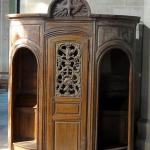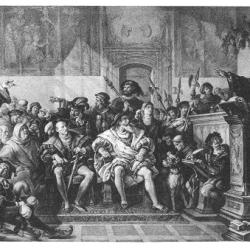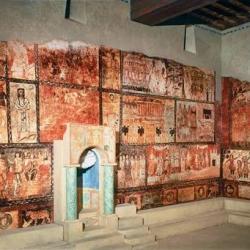The late Steve Hays was a Protestant Reformed, anti-Catholic apologist, very active online, who ran the site, Triablogue. In this series of articles, I will be critiquing many portions of a collection of his entitled “Annotated prooftexts [for Calvinism]” (7-7-14). Hays writes in his introductory section:
I’m going to quote a number of Reformed prooftexts, in canonical order, then quote interpretive comments by various scholars. . . . Taken by themselves, Reformed prooftexts might seem to beg the question by presupposing a Reformed interpretation thereof. . . . I’ve gone beyond bare prooftexting to provide exegetical arguments for the Reformed interpretation. . . .
Although both Calvinists and Arminians have their one-verse prooftexts, Reformed theological method is based less on snappy one-liners than tracing out the flow of argument or narrative arc in larger blocks of Scripture (e.g. Gen 37-50; Exod 4-14; Isa 40-48; Jn 6, 10-12, 17; Rom 9-11; Eph 1-2, 4).
Hays utilizes the English Standard Version (ESV) of the Bible, which was produced by over one hundred evangelical Protestant scholars, and follows the literary tradition of the KJV and especially the RSV. When I cite additional Scripture in my replies, it will be the RSV version.
*****
1 Sam 2:25
25 If someone sins against a man, God will mediate for him, but if someone sins against the Lord, who can intercede for him?” But they would not listen to the voice of their father, for it was the will of the Lord to put them to death.
A sobering statement is contained in 2:25b. The wording should be carefully noticed (see note on 2:25). It does not say that Eli’s sons had become so hardened in their sinful ways that the Lord decided to put them to death, but rather than Eli’s sons did not listen to him because the Lord was already planning to put them to death. In other words, the resistance of Hophni and Phinehas to Eli’s call to repentance was not the reason for God’s judgment but was the result of his prior judgment. J. Vannoy, 1-2 Samuel (Tyndale 2009), 59.
I would say this is assuming what needs to be proven: that God was foreordaining their deaths; therefore they could do no other and He had to judge them to death. Such a notion is blasphemous and would turn God into an arbitrary moral monster (equivalent in morality to the devil). Accordingly, many Bible commentators think otherwise:
Ellicott’s Commentary for English Readers: The Lord’s resolution to slay them was founded on the eternal foreknowledge of their persistence in wrong-doing. There seems to be a period in the sinner’s life when the Spirit of the Eternal ceases to plead; then the man is left to himself, and he feels no longer any remorse for evil done; this is spoken of in Exodus 4:21 as “hardening the heart.” This period in the life of Hophni and Phinehas apparently had been reached when the Lord resolved to slay them.
Benson Commentary: Or, as the Hebrew may be rendered, Therefore the Lord would slay them. The sense, however, according to the common translation, is Scriptural and good. They had disregarded many admonitions, which, no doubt, their father had given them; they had now hardened their hearts, and sinned away their day of grace, and therefore God had given them up to a reprobate mind, and determined to destroy them, 2 Chronicles 25:16.
Cambridge Bible for Schools and Colleges: Compare the language of Exodus 4:21, and Joshua 11:20, where we read that the Lord hardened the hearts of Pharaoh and the Canaanites; and 1 Samuel 16:14, where it is said that “an evil spirit from the Lord troubled Saul.” Yet we are assured that “the Lord delighteth in mercy” (Micah 7:18), and “hath no pleasure in the death of him that dieth” (Ezekiel 18:32). This coexistence of mercy and judgment in the divine will (Exodus 34:6-7) is a mystery which necessarily transcends our comprehension. But it must be carefully noted that it is not till Pharaoh has turned a deaf ear to repeated warnings, not till the Canaanites have polluted themselves with intolerable abominations, that God hardens their hearts; not till Eli’s sons have ignored His existence and defied His laws does He determine to slay them: not till Saul has set at naught his calling and deserted God, is he deserted by Him. Obstinate impenitence may be judicially punished by the withdrawal of the grace which leads to repentance.
Jamieson-Fausset-Brown Bible Commentary: It was not God’s preordination, but their own wilful and impenitent disobedience which was the cause of their destruction.
Adam Clarke’s Commentary: It was their not hearkening that induced the Lord to will their destruction.
The idea here would be that the Lord had determined to judge (kill) them before this time, but this decision had been made (though “known” from all eternity, as are all things for God) because of their continued rebellion. The sinfulness of these two sons of Eli the priest, Hophni and Phin’ehas, leading to their judgment, is evident in the larger context:
1 Samuel 2:12 Now the sons of Eli were worthless men; they had no regard for the LORD.
1 Samuel 2:17 Thus the sin of the young men was very great in the sight of the LORD; for the men treated the offering of the LORD with contempt.
1 Samuel 2:22-24 Now Eli was very old, and he heard all that his sons were doing to all Israel, and how they lay with the women who served at the entrance to the tent of meeting. [23] And he said to them, “Why do you do such things? For I hear of your evil dealings from all the people. [24] No, my sons; it is no good report that I hear the people of the LORD spreading abroad.
1 Samuel 2:30-35 . . . now the LORD declares: `Far be it from me; for those who honor me I will honor, and those who despise me shall be lightly esteemed. [31] Behold, the days are coming, when I will cut off your strength and the strength of your father’s house, so that there will not be an old man in your house. [32] Then in distress you will look with envious eye on all the prosperity which shall be bestowed upon Israel; and there shall not be an old man in your house for ever. [33] The man of you whom I shall not cut off from my altar shall be spared to weep out his eyes and grieve his heart; and all the increase of your house shall die by the sword of men. [34] And this which shall befall your two sons, Hophni and Phin’ehas, shall be the sign to you: both of them shall die on the same day. [35] And I will raise up for myself a faithful priest, who shall do according to what is in my heart and in my mind; and I will build him a sure house, and he shall go in and out before my anointed for ever.
God says, “those who honor me I will honor, and those who despise me shall be lightly esteemed.” This places the blame for the sin and rebellion squarely on man, not God. The text does not say (as it seems it should have, under a Calvinist premise) something along the lines of: “those whom I have foreordained to honor me I will honor, and those whom I have foreordained to despise me shall be lightly esteemed.”
God makes it clear again and again, that if His children keep His commandments; abide by them, that things will go well with them. But if they do not, they will be judged as a result of their own fault, and negative consequences will occur. Here are two of the clearest statements of this biblical precept and expressed divine will in the Old Testament:
Numbers 15:30-31 But the person who does anything with a high hand, whether he is native or a sojourner, reviles the LORD, and that person shall be cut off from among his people. [31] Because he has despised the word of the LORD, and has broken his commandment, that person shall be utterly cut off; his iniquity shall be upon him.
2 Chronicles 7:19-22 “But if you turn aside and forsake my statutes and my commandments which I have set before you, and go and serve other gods and worship them, [20] then I will pluck you up from the land which I have given you; and this house, which I have consecrated for my name, I will cast out of my sight, and will make it a proverb and a byword among all peoples. [21] And at this house, which is exalted, every one passing by will be astonished, and say, `Why has the LORD done thus to this land and to this house?” [22] Then they will say, `Because they forsook the LORD the God of their fathers who brought them out of the land of Egypt, and laid hold on other gods, and worshiped them and served them; therefore he has brought all this evil upon them'”
This order of 1) man’s rebellion and wickedness, bringing about and causing 2) God’s judgment is made even more crystal clear by St. Paul:
Romans 1:18-28 For the wrath of God is revealed from heaven against all ungodliness and wickedness of men who by their wickedness suppress the truth. [19] For what can be known about God is plain to them, because God has shown it to them. [20] Ever since the creation of the world his invisible nature, namely, his eternal power and deity, has been clearly perceived in the things that have been made. So they are without excuse; [21] for although they knew God they did not honor him as God or give thanks to him, but they became futile in their thinking and their senseless minds were darkened. [22] Claiming to be wise, they became fools, [23] and exchanged the glory of the immortal God for images resembling mortal man or birds or animals or reptiles. [24] Therefore God gave them up in the lusts of their hearts to impurity, to the dishonoring of their bodies among themselves, [25] because they exchanged the truth about God for a lie and worshiped and served the creature rather than the Creator, who is blessed for ever! Amen. [26] For this reason God gave them up to dishonorable passions. Their women exchanged natural relations for unnatural, [27] and the men likewise gave up natural relations with women and were consumed with passion for one another, men committing shameless acts with men and receiving in their own persons the due penalty for their error. [28] And since they did not see fit to acknowledge God, God gave them up to a base mind and to improper conduct.
The above passages utterly destroy the blasphemous Calvinist notion of God ordaining sin and evil. Human beings cause their own troubles and their own damnation. This was the case with Hophni and Phin’ehas. But if they are saved, it is because of God’s grace that they chose to accept and to follow God and keep His commandments as a result.
***
Photo credit: Nick Kenrick (4-5-10). “The Burning Bush” [Flickr / CC BY-NC-SA 2.0 license]
Summary: Did God foreordain that the priest Eli’s sons, Hophni and Phinehas were to be judged and killed (Calvinism), or did their own freely chosen sin cause their demise?
***


















